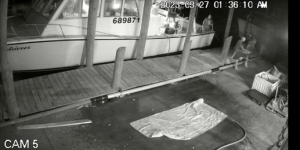Blog Post
Environmental Crimes Bulletin February 2024 Week 1
In this issue:
- United States v. Rodney Thomas, No. 2:23-CR-00160 (W.D. Pa.), AUSA Nicole A. Stockey
- United States v. Brazos Urethane, Inc., Texas City, Texas, No. 3:24-CR-00017 (W.D. Wisc.), AUSA Daniel Graber
- United States v. Justin LeMaster, et al., No. 3:23-CR-00638 (D.S.C.), AUSA Elle Klein
United States v. Rodney Thomas, No. 2:23-CR-00160 (W.D. Pa.), AUSA Nicole A. Stockey
On February 5, 2024, a court sentenced Rodney Thomas to pay a $2,500 fine, complete a two-year term of probation, and perform 50 hours of community service. Thomas also will pay $9,800 in restitution to the Pennsylvania Wildlife Rehabilitation and Education Council. Thomas pleaded guilty to violating the Bald and Golden Eagle Protection Act (16 U.S.C. § 668(a)).
In May 2023, Thomas shot and killed a mature bald eagle with an air rifle in Mount Pleasant, Pennsylvania. An eyewitness contacted law enforcement after observing the bird’s death and seeing Thomas’s car drive off. Thomas turned himself in shortly thereafter, admitting that he shot the bird.
The U.S. Fish and Wildlife Service Office of Law Enforcement conducted the investigation with assistance from the Mount Pleasant Township Police Department, the Washington County District Attorney’s Office, and the Pennsylvania State Game Commission.
United States v. Brazos Urethane, Inc., Texas City, Texas, No. 3:24-CR-00017 (W.D. Wisc.), AUSA Daniel Graber
On February 7, 2024, the government entered into a deferred prosecution agreement with Brazos Urethane, Inc. Texas City, Texas (Brazos), in connection with an illegal asbestos abatement project at a prison.
In 2014, Brazos entered into a $4 million contract with the Bureau of Prisons (BOP) to replace roofs on buildings located at the Oxford Federal Correctional Institution (FCI Oxford), located in Oxford, Wisconsin.
As part of the BOP contract, Brazos certified that it would maintain a safe work environment, follow all federal and state laws regarding the removal and disposal of hazardous waste materials, and obtain all necessary permits from the Wisconsin Department of Natural Resources (DNR). During the abatement, however, the company dumped roofing waste materials containing asbestos at another property. Brazos concealed this illegal dumping from the BOP and Wisconsin DNR and lied about it when confronted by investigators.
In 2022, the Wisconsin DNR ordered Brazos to properly and completely clean up the roofing waste, which it did at a cost of $480,000.
As part of the deferred prosecution agreement, Brazos agreed to immediately pay a monetary penalty of $300,000. That figure represents the amount of money Brazos attempted to save by engaging in the illegal dumping conduct. Brazos also entered into a three-year corporate compliance program designed to prevent further violations of contract fraud and federal environmental laws. At the end of the three-year program, the charge against Brazos will be dismissed.
The U.S. Department of Justice Office of Inspector General conducted the investigation.
United States v. Justin LeMaster, et al., No. 3:23-CR-00638 (D.S.C.), AUSA Elle Klein
On February 8, 2024, a court sentenced Justin LeMaster to pay a $1,200 fine and complete a one-year term of probation. LeMaster is also jointly and severally responsible for paying $3,000 in restitution to the Kansas Department of Wildlife and Parks. LeMaster is the final hunter to be sentenced in this case. Sean Paschall was sentenced in December 2023 to pay a $5,000 fine, complete a two-year term of probation, and pay the $3,000 in restitution. Chad Seymore was sentenced November 28, 2023, to pay a $10,000 fine, complete a three-year term of probation, and pay $5,292 as a separate amount of restitution.
Between September 2018 and December 2019, the three hunters transported deer heads from Kansas into South Carolina. Authorities tested one of the heads, which came back positive for chronic wasting disease. All three defendants pleaded guilty to Lacey Act misdemeanor violations (16 U.S.C. §§ 3372(a)(2)(A), 3373(d)(2)).
The South Carolina Department of Natural Resources and the U.S. Fish and Wildlife Service Office of Law Enforcement conducted the investigation.
Updated January 20, 2025

 U.S. Department
of Justice
U.S. Department
of Justice



